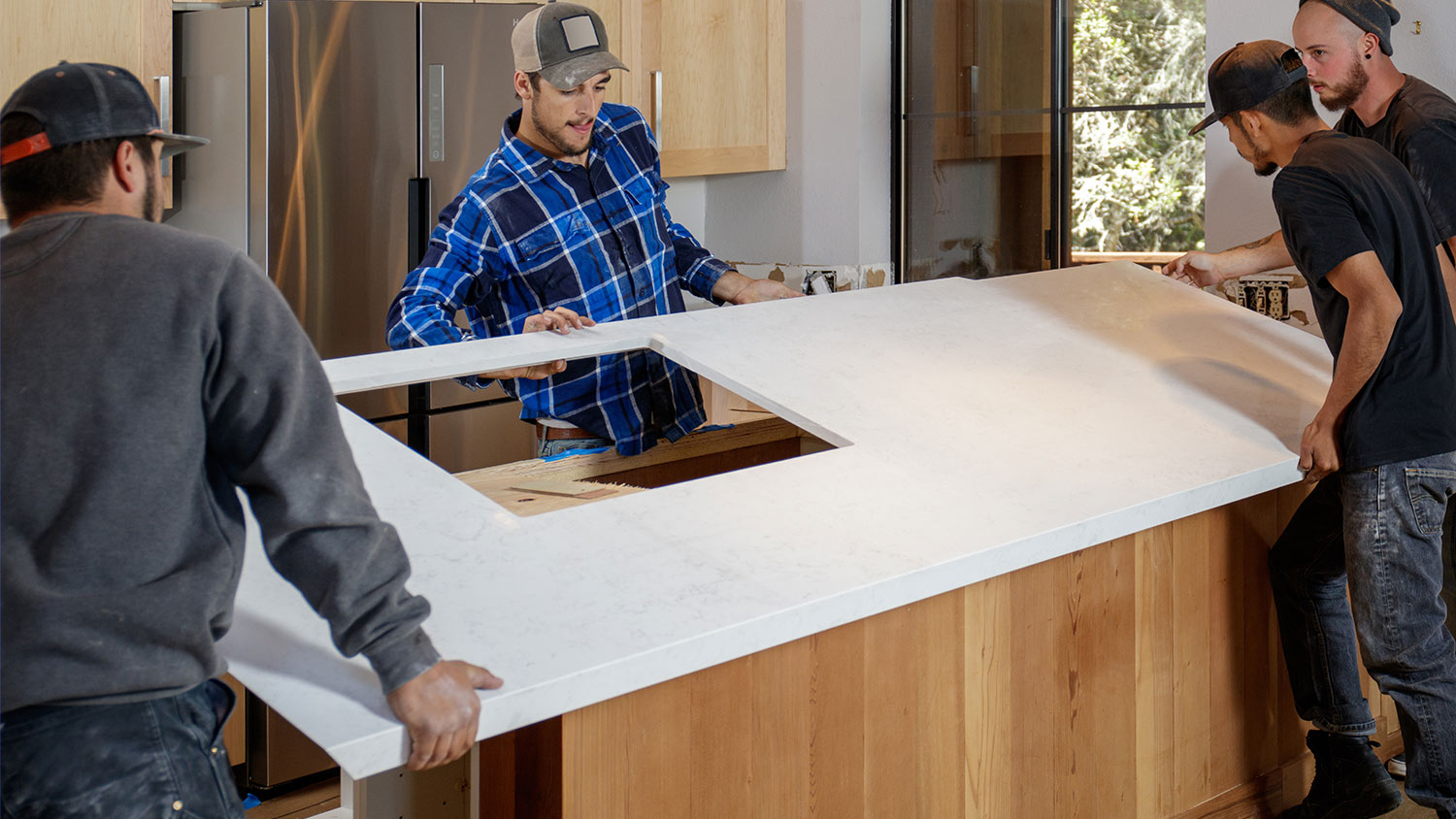
Countertop repair costs may be the deciding factor between replacing or repairing your counter. Let’s break down the cost to repair, resurface, or relaminate.
Get cracking with these easy kitchen countertop repairs


A countertop contractor will have all the equipment needed to repair countertops, while most homeowners will have to buy or rent it.
Filling in cracks and chips requires precision, which a pro can skillfully deliver to make the countertop look like new again.
A pro knows which repair techniques will work best based on the type of countertop material you have.
An expert can also advise you on whether repairing or replacing the countertop is the more cost-effective option.
Damaged kitchen countertops can drag the entire room down. If your countertops have cracks, chips, or stains, you might wonder whether you can repair them. This guide explains how to repair kitchen countertops to restore them to their former glory.

Follow these steps once you’re ready to tackle your kitchen countertop repair.
First, clear off the countertop to determine the type and extent of the damage. If you have a cleaner specifically designed for your countertop material, use it. If not, use a mild all-purpose cleaner or a simple dish soap and water mixture. Wipe the countertops thoroughly using a soft sponge or microfiber cloth, then dry the surface with a clean cloth.
Once the countertop is clean and dry, inspect the damage and make a repair plan. Check the countertops for signs of wear and tear, including cracks, chips, gouges, stains, or heat damage. Even a novice DIYer can repair small cracks and minor damage in certain materials.
If your countertops have small cracks or chips, you can fill them in using a few simple store-bought materials. Depending on the countertop material, you might use the following:
Laminate repair paste: This paste comes in varying colors to find the best match for your countertop. Apply the paste to the scratches or gouges, taking care not to apply too much since you won’t be able to sand it down once dry without damaging the surrounding laminate.
Epoxy filler: This filler can be used on stone and solid surface countertops. Apply it directly to the damaged area and use a craft stick to push it in. Once hardened, sand and blend the epoxy to camouflage the imperfection.
Silicone caulk: Some countertop cracks can be repaired using silicone caulk. After cleaning the damaged area, apply the caulk and spread it over the crack or chip using a putty knife.
Superglue: Run-of-the-mill superglue could be all you need to repair a countertop crack or chip. Apply the glue to the crack and push it in with a toothpick. Let it dry thoroughly and sand it down as needed.
Some countertops are more prone to stains than others, so you’ll need to be familiar with how to clean stains from different countertops. Start by cleaning the countertop thoroughly with a mild cleaner or soap and water. Then, apply a baking soda and water paste over the stain and cover it with plastic wrap overnight. Wipe the paste off the next day to see if the stain remains.
Stubborn stains on a solid stone surface may require hydrogen peroxide and baking soda to remove. Before using a cleaner on your countertop, check the manufacturer’s care, cleaning, and stain removal recommendations.
One of the main differences between natural and synthetic stone countertops is their resistance to water damage. Solid stone countertops like marble, granite, and quartzite are naturally porous and need regular sealing to prevent damage. To check whether your countertops need to be resealed, put a drop of water in an inconspicuous area and wait 15 to 20 minutes. If the water makes a dark mark on your countertop, it needs resealing.
To reseal countertops, clean and dry them thoroughly, then apply the sealant with a soft cloth using circular motions. Repeat with a second coat if needed, wipe off the excess sealer, and let the countertops cure for at least 24 hours before using them again.

Kitchen countertops can sustain damage in several ways, though different countertop materials are susceptible to varying types of damage:
Laminate countertops are susceptible to chips and scratches from knives. They can also be damaged by heat and water.
Natural stone countertops, like granite, marble, and quartzite, require regular sealing to prevent staining. They can also crack or chip upon impact and are prone to etching and scratching from abrasive cleaners and materials.
Quartz countertops are sensitive to heat and can sustain damage if they come into contact with hot pans.
Soapstone countertops are softer than solid stone countertops and more susceptible to wear and tear, including scratches, chips, and dings.
Solid-surface countertops, like Corian, are not scratch-proof and can be damaged by cutting directly on the counter without a cutting board. They can also burn if exposed to high heat.
Butcher block countertops are naturally porous and must be sealed to prevent water damage and staining. They are easy to scratch and dent and do not handle heat well.
The cost of repairing kitchen countertops depends on the countertop material and the type and extent of the damage. Expect to pay an average of $380, or between $210 and $540, to repair your countertop.
Based on responses from 8,700 Angi customers, one of the most common countertop repairs is fixing damage such as chips and cracks, which accounts for 38.5% of requests. Additionally, 15.3% of homeowners requested sealing, underscoring the importance of regular maintenance in keeping countertops looking their best and extending their lifespan.

Protecting your kitchen countertops goes a long way toward preventing damage. Follow these tips to keep your countertops in like-new condition for longer.
Always use a cutting board when chopping veggies, fruits, or other foods.
Place a hot pad or trivet on the countertop before placing a hot pan or skillet down.
Clean up spills immediately to prevent stains.
Use a coaster and placemat when eating and drinking at your kitchen counter.
Avoid using harsh or abrasive cleaners on your countertop, and stick to cleaners intended for your specific countertop material.
Don’t place heavy objects, like cast-iron pans, near the edges of your countertops, as this can cause cracks.
With the right tools and supplies, a handy DIYer can repair minor scratches, cracks, and stains on your kitchen countertops. If you decide to tackle this as a DIY project, follow the directions thoroughly and ensure you have the time to dedicate to the repair.
More severe damage, like a significant crack or uneven countertop, requires professional repair. A local countertop contractor can examine the damage and recommend the proper repair. A pro has the experience, tools, and supplies to make your countertops look new—or, if the damage is beyond repair, they can quote you to replace the countertop instead.
From average costs to expert advice, get all the answers you need to get your job done.

Countertop repair costs may be the deciding factor between replacing or repairing your counter. Let’s break down the cost to repair, resurface, or relaminate.

The cost of stainless steel countertops may seem shocking compared to laminate, but their durability may be worth it. Here’s how much you can expect to spend.

Discover cabinet installation cost estimates, including average prices, key cost factors, and tips to save on your new kitchen or bathroom cabinets.

Those dull, annoying marks on your countertop might not be stains. Discover what stone countertops etching is and what you can do about it.

How much does granite weigh? Estimate the weight of granite countertops for any size and thickness with our quick and accurate calculator tool.

Although cutting stone may seem difficult, it is possible with the right tools and knowledge. Learn how to cut granite for bathroom and kitchen counters.